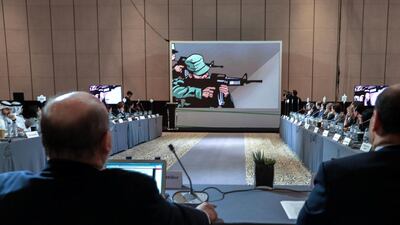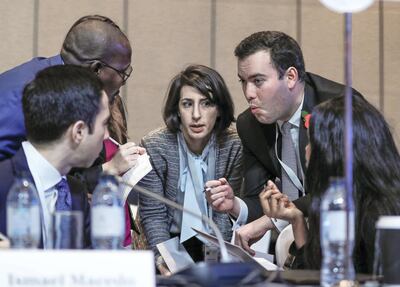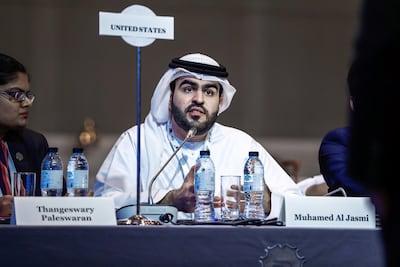Picture this: Pakistani militants launch a devastating terror attack on the Indian capital on Republic Day. At least 300 innocent people are killed.
Tension builds. Militants seize the nuclear weapons that Pakistan have deployed to the border. A dangerous regional issue escalates into an alarming global one, drawing in superpowers, upping the ante and putting the safety of the entire world at stake. India and Pakistan stand at a precipice. Can they pull back from the brink?
A simulation of this hypothetical dual international crisis played out in Abu Dhabi on Thursday. A ballroom in the St Regis hotel on Saadiyat became an international diplomatic nerve centre where young diplomats were tested by a crisis that could destroy the world.
This event is known as the future diplomats “peace game” and took place on the final day of the Abu Dhabi Diplomacy Conference, known as Diplocon. It is a type of war game for diplomats and is convened by the Foreign Policy magazine. The games simulate how to respond peacefully to a crisis situation with the same rigour that’s usually applied to war.
In a series of three videos, the scenario between India and Pakistan was played out:
The first outlined the prospect of nuclear war between the two rivals.
The second saw militants seize Pakistan’s nuclear weapons.
The third brought news Pakistan had recovered the nuclear weapons with the UN calling for a new rules surrounding nuclear safety. Following each video, delegates conferred in hushed tones, consulted experts and held multilateral meetings with other sides to deal with the crisis.
Then they responded formally with their positions. Some issues were resolved but others were not. For example, India withdrew its troops from Pakistan, while Pakistan agreed to extradite a militant wanted by India. A mock press conference was also held.
Ravi Agrawal is managing editor of Foreign Policy and he moderated the event. “The situation is very realistic,” he said. “The players are finding their feet. But it allows you to practise compromising, how to react to pressure and being put on the spot.”
The responses by the young diplomats were largely measured, intelligent and focused mostly on de-escalation. They advised the creation of a hotline between the main protagonists, the possible enforcement of no-fly zones and securing seaports. The majority advised against unilateral action.
“We have a legal right to defend ourselves and we only target terror elements,” said the Indian representative after the attack was revealed.
“We do not wish to antagonise Pakistan and want to work with the international community.” In response, Pakistan denied any state involvement, called for India to withdraw its troops. India had denied its soldiers had crossed the border.
_________________
Live coverage of Diplocon:
Minister fears voices of intolerance becoming louder across the globe
Nations must break up the diplomatic boys' club, UAE summit hears
Gargash: in the 15-minute news cycle, we can't afford to ignore criticism
Middle East states 'need to speak to their enemies'
_________________
The peace game featured about 33 students from 22 training institutes across five continents. Diplomats do not represent their own countries during the simulation, while a rotating cast of three experts advise on unfolding events. Some are already junior diplomats, while others are in training.
Steven Miller, director of the Belfer Center’s international security programme at Harvard, was one of the judges.
“You can’t fully replicate the intensity of a real crisis,” he said. “But … it creates experiences that can come in useful,” he said.
Reflecting on the responses, Mr Miller said some had focused on the broader picture and not addressed the urgent questions. “You need to give yourselves time in a crisis to de-escalate That lesson is coming through today.”
Another judge and academic, Joshua White, said the artificial crisis pushed people to think in a way a relaxed training programme would not. “It is also good for people to familiarise themselves with the dynamics of a region they may not studied in depth. That builds diplomatic empathy,” said Mr White.
Hundreds of people attended the event over the two days, which featured talks, workshops and panel discussions to reflect on the trends and challenges in global diplomacy.




